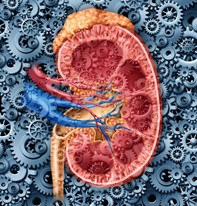Peer Reviewed
Perspectives
Renal disease in diabetes: when to investigate for causes other than diabetes
Abstract
In patients with type 1 or type 2 diabetes and chronic kidney disease, a careful assessment is needed to identify nondiabetic kidney disease because some forms of this condition are treatable and remission is possible.
Key Points
- The spectrum of diabetic kidney disease is much broader than the traditional proteinuric model described in the 1980s.
- Up to 30% of patients with chronic kidney disease and type 2 diabetes have been reported to have nondiabetic kidney disease (NDKD).
- It is important to identify such patients because some forms of NDKD are treatable, sometimes leading to remission.
- Patients with diabetes and reduced kidney function are at risk of contrast-induced nephropathy.
- Clues to support a diagnosis of NDKD include: early onset of proteinuria or a rapid decrease in glomerular filtration rate (GFR) with a short duration of diabetes; the presence of an active urine sediment; signs or symptoms of another systemic disease; the absence of retinopathy or a significant reduction in GFR after starting a renin-angiotensin system inhibiting agent; and small kidneys on an ultrasonogram.
Purchase the PDF version of this article
Already a subscriber? Login here.

